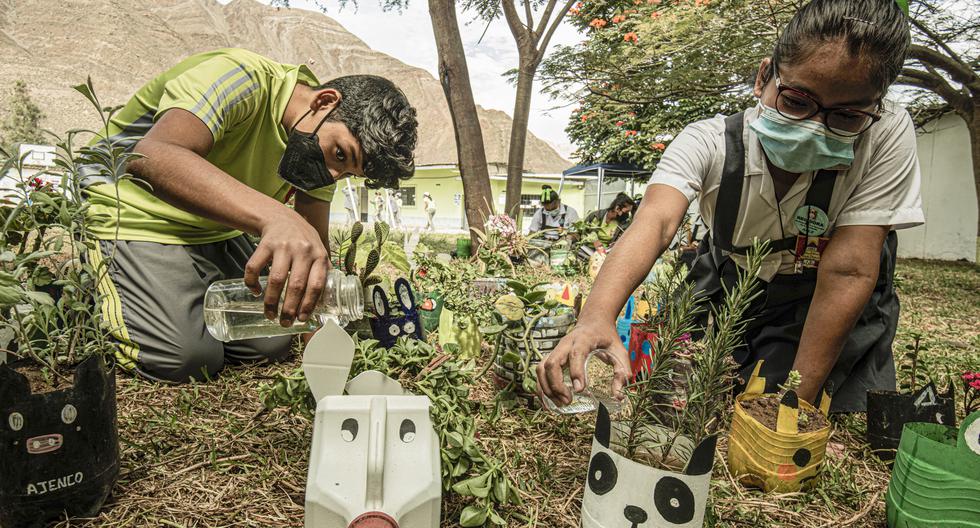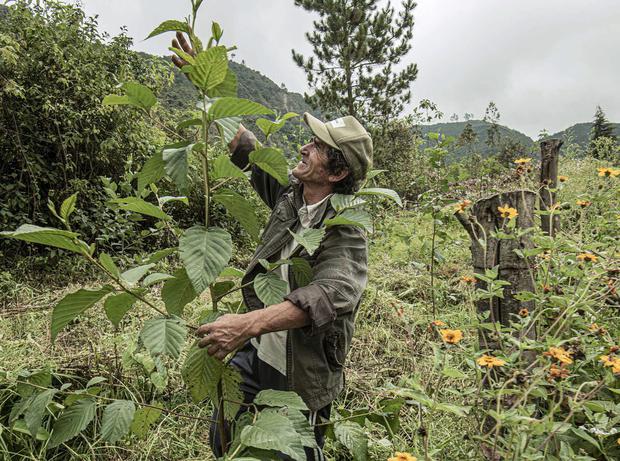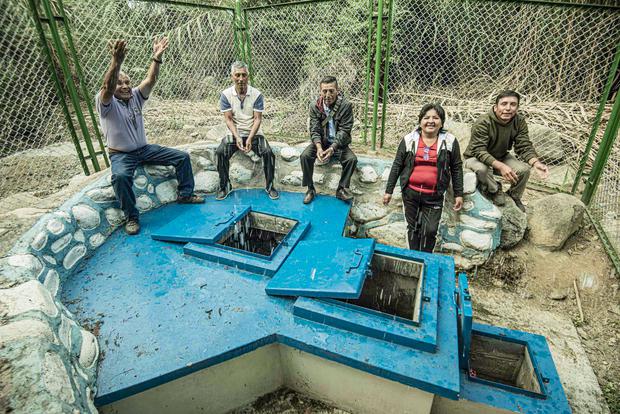Guardians of Water: The communities in Trujillo that ‘sow’ and ‘harvest’ this natural resource to survive
By Flor Ruiz | June 30, 2022
Originally published in Spanish in El Comercio
With a methodology that is applied in countries in Africa, Central America and some countries in South America, the communities of Cascas, three hours from Trujillo, enjoy, take advantage of, recycle, and take care of an asset that has always eluded them: water. This is how their dream began, a decade ago.

"If there is no light, we get light from other elements, but if we lack water, we cannot live. It is vital that we save it, take care of it. What has changed in you regarding the care and conservation of water?" asks teacher Rosa Chunque.
"When we get to the classroom, we wash our hands; while we soap our hands, we close the tap. Then we open it again to rinse our hands. We are aware that water is vital for us; we know that by reusing it we utilize it for the plants in our vegetable garden. Now we take care of the water in our houses; we will soon have meters, but we already know how to measure it," answers José Antonio, a tenth-grade student at the La Palmira School, in the hamlet of La Palmira, in the district of Cascas, which is located in the province of Gran Chimú, in the northern Andes range area of La Libertad.
For twelve years, the international non-profit organization Water for People (WFP) has been working in this area with the population, and has been providing training on water management, sanitation, and environmental approach in 65 schools in all the hamlets and villages. Just over a decade ago, the infrastructure and drinking water systems in Cascas were appalling. The few reservoirs that existed were obsolete and in poor conditions.
The quality of the water was poor: it was carried through pipes, the sources were exposed. The population had diarrheal problems and the people did not know how to organize themselves to find a solution. This has been work carried out over time. The Sanitation Services Administrative Boards (JASS – local water and sanitation committees) were implemented, and their work include chlorination control and charges for consumption, among other services. WFP monitors them and provides technical assistance, as well as house-to-house support, and they (the JASS) report on water quality, chlorine use, water boiling, hand washing, and wastewater and solid waste management. Now there are 38 JASS in Cascas, and almost all rural population centers have successfully been provided quality drinking water.

Surrounded by her rowdy hens and her noble and quiet sheepdog, Doña Lorenza Matute, 73, shows us her bathroom, opened two months ago with her own resources and under the management of JASS and WFP.
"It is the first time that I have a toilet, a bathroom with a sink inside. Four years ago drinking water was made available, and we now feel safer, we live better. I no longer limit myself in using water like before: I like to have water because I can cook my wheat."
In the nearby hamlet of El Chorrillo, water planting and harvesting has been implemented in order to preserve the water sources. It is a conservation and reforestation practice that seeks to capture the greatest amount of water when it rains to infiltrate it into the soil. In this way, in the rainy season, the water does not run off and is not lost. In addition, native species and trees are reforested.
Families that conserve their sources are helped to plant avocados and "talla," a timber tree used in the agribusiness for dyes and oils. This allows them to generate income, but the purpose is, above all, to keep the environment. Currently, financial funds are needed to implement better services in schools, now that students have returned to face-to-face classes.

School 82026, in the hamlet of Chapolan is a one-classroom, one- teacher school. Robert Merino teaches eight children of different ages at the same time. At the entrance, 12-year-old Joseph Julca lifts little Diego up for him wash his hands in the newly built sink facility. We look at the bathroom: a very small space with two obsolete toilets, in poor conditions, and the roof covered with a precarious corrugated iron sheet.
"These are the toilets I found five years ago, when I first came here. They cannot be improved because they do not have a biodigester, they cannot be used. More infrastructure is needed to improve them," says the teacher.
Progress has been made, but there is still a lot to be done. These ‘guardians’ of water – schools, the local government, the organized community – know what it means to wait for a resource like this one to be made available to them. Now, they also know how to manage this resource, so that they do not have to wait another twelve years.
Published in Spanish in El Comercio, Peru’s leading daily newspaper and one of the oldest Spanish-language papers in the world. Translated into English by Water For People.
Guardianes del agua: las comunidades en Trujillo que ‘siembran’ y ‘cosechan’ este recurso natural para sobrevivir
Con una metodología que se aplica en países de África, Centroamérica y algunos de Sudamérica, las comunidades de Cascas, a tres horas de Trujillo, disfrutan, aprovechan, reciclan y cuidan un bien que les fue siempre esquivo: el agua. Así empezó su sueño, hace una década.
